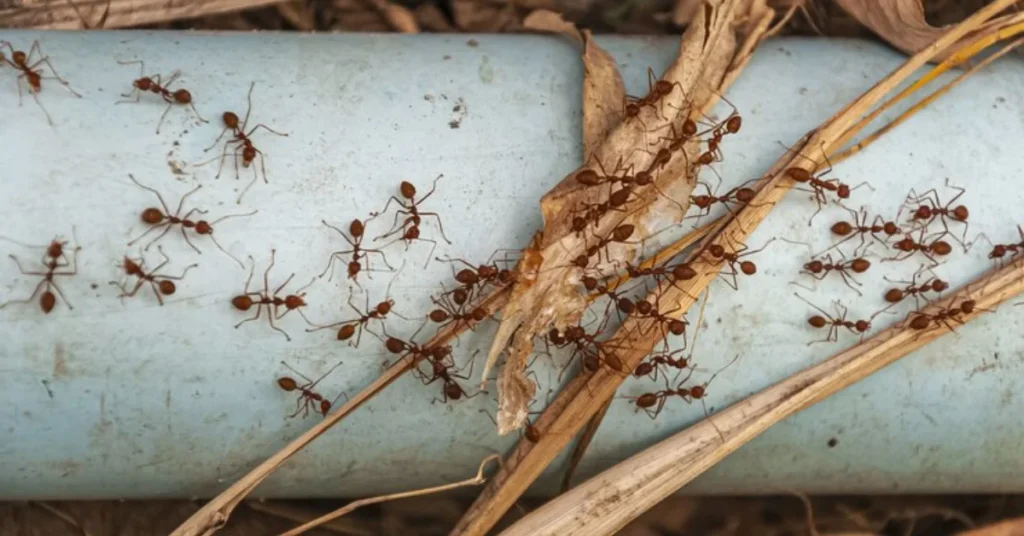Ant infestations can quickly escalate from a minor inconvenience to a major problem if not addressed promptly. These tiny invaders are not only persistent but can also contaminate food supplies and compromise the hygiene of a space. Effective ant control requires a proactive approach that combines prevention, monitoring, and targeted treatment. This guide delves into actionable strategies for managing ant infestations in both residential and commercial settings.
Understanding Ant Behavior
To effectively manage ant infestations, it is essential to understand their behavior and what attracts them. Ants are social insects that operate in colonies, often with a single queen responsible for reproduction and hundreds or thousands of worker ants tasked with foraging and maintaining the nest. These workers leave chemical trails to guide others to food sources, making it crucial to eliminate attractants and disrupt their pathways.
Common reasons ants invade properties include:
- Food Availability: Crumbs, spills, and improperly stored food attract ants.
- Moisture: Leaky pipes, damp areas, and standing water provide the moisture ants need to survive.
- Access Points: Cracks, gaps, and unsealed entryways offer easy access to buildings.
Prevention: The First Line of Defense
The best way to control ants is to prevent them from entering in the first place. Proactive prevention measures can significantly reduce the likelihood of infestations.
- Maintain Cleanliness
- Wipe down countertops and dining areas after meals.
- Sweep and mop floors regularly to remove crumbs and spills.
- Store food in airtight containers to minimize accessibility.
- Eliminate Moisture Sources
- Fix leaky pipes and faucets promptly.
- Ensure proper drainage around the property to avoid standing water.
- Use dehumidifiers in damp areas, such as basements.
- Seal Entry Points
- Inspect the property for cracks, gaps, and openings around doors and windows.
- Use weather stripping and caulking to seal potential access points.
- Install door sweeps and mesh screens to block entry.
Identifying and Targeting Ant Species
Different ant species require different approaches to control. Common types of ants that invade properties include:
- Argentine Ants: These ants form massive colonies and prefer sweet foods.
- Carpenter Ants: Known for damaging wooden structures, they nest in damp or decaying wood.
- Odorous House Ants: These ants emit a distinct smell when crushed and are attracted to sugary substances.
- Pavement Ants: Often found nesting in cracks in concrete, they forage for a variety of food sources.
Proper identification is critical to implementing effective treatment methods. Consider consulting pest control professionals for accurate identification and tailored solutions.
Effective Ant Control Methods
- Natural Remedies Natural solutions can be a safe and environmentally friendly way to manage ant infestations. Popular options include:
- Vinegar Solution: Mix equal parts water and vinegar to disrupt ant trails and deter entry.
- Diatomaceous Earth: This natural powder dehydrates and kills ants when they come into contact with it.
- Essential Oils: Peppermint and tea tree oils are known to repel ants. Dilute with water and spray along ant trails and entry points.
- Baiting Systems Ant baits are an effective way to target entire colonies. Worker ants carry the bait back to the nest, where it is shared with other members, including the queen. Choose baits that are specific to the species you’re dealing with and place them near ant trails.
- Chemical Treatments In cases of severe infestations, chemical treatments may be necessary. Use insecticides labeled for ant control, focusing on outdoor perimeters and entry points. Always follow safety guidelines when applying these products.
- Professional Pest Control Services For large or persistent infestations, professional assistance may be required. Companies like Strong Pest Control specialize in comprehensive pest management solutions, including targeted ant control strategies.
Managing Ant Infestations in Commercial Spaces
Commercial properties face unique challenges when it comes to ant control. High foot traffic, food preparation areas, and multiple access points make these spaces particularly vulnerable. Here are key strategies for businesses:
- Employee Training Train staff to identify signs of ant activity and maintain cleanliness standards. This includes proper waste disposal and food storage practices.
- Regular Inspections Conduct routine inspections to identify and address vulnerabilities, such as cracks or unsealed areas.
- Integrated Pest Management (IPM) Implement an IPM approach that prioritizes prevention, monitoring, and targeted treatments. This minimizes the need for widespread chemical applications and reduces environmental impact.
Common Missteps to Avoid
- Ignoring Early Signs Small infestations can quickly grow if not addressed promptly. Act at the first sign of ant activity.
- Using the Wrong Products Over-the-counter sprays may kill individual ants but rarely address the root cause—the colony.
- Inconsistent Practices Maintaining cleanliness and sealing entry points must be consistent to remain effective.
Long-Term Solutions for Ant Control
Achieving long-term success in ant control requires a combination of strategies:
- Ongoing Maintenance Regular cleaning, monitoring, and sealing efforts are essential to keeping ants at bay.
- Landscaping Adjustments Trim vegetation and maintain a gap between plants and the building’s perimeter. Avoid placing mulch directly against the foundation, as it can attract ants.
- Collaboration with Professionals Partnering with experts ensures a comprehensive approach to ant control. Professionals like Strong Pest Control provide tailored solutions that align with the specific needs of your property.
Conclusion
Ant control is a vital aspect of maintaining a clean and hygienic environment, whether in a home or a commercial property. By combining preventive measures, proper identification, and targeted treatments, you can effectively manage and prevent ant infestations.
Strong Pest Control’s expertise in pest management ensures that property owners can enjoy peace of mind with proactive and reliable ant control solutions. A commitment to ongoing maintenance and vigilance will keep your property ant-free for the long term.







